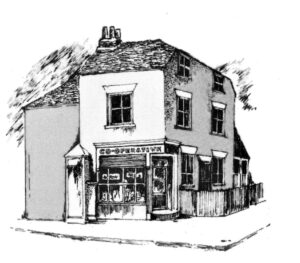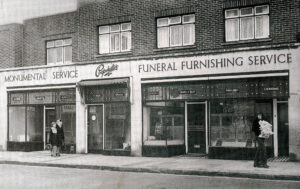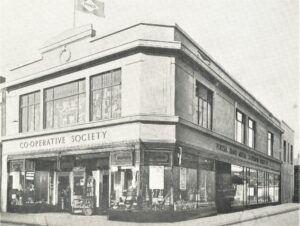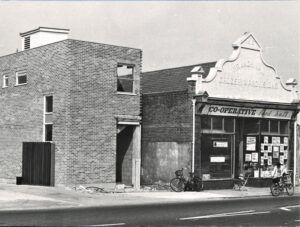Southern Co-op celebrates 150th anniversary

First store in Charles Street, Portsmouth
Portsmouth’s local co-operative, which was the first to open a fully self-service supermarket in Great Britain, is celebrating its 150th anniversary this Friday.
Southern Co-op, originally named Portsea Island Mutual Co-operative Society, was first formed on 24 March 1873 and is one of the remaining independent societies in the country.
Currently known for its local branches of The Co-operative Food and The Co-operative Funeralcare, it started off with just one store in Portsmouth before gradually growing to 62 grocery branches in 1939 and to more than 300 outlets in total today.
It was formed by dockyard workers tackling exploitation, inequality and life-threatening poverty. Its founders set out ‘to develop our Society until it is capable of supplying the wants and bestowing financial and social benefits to all people residing in the district and thus benefit the community as a whole’.
Mark Smith, Southern Co-op’s Chief Executive, said: “Our communities are still at the forefront of our purpose, alongside long term sustainability plans which include ambitious climate action goals and programmes that tackle food waste and support nature recovery.

Funeral branch in Fratton
“Sadly poverty remains a very real threat to our society, so together with the support of our colleagues, members, customers and partners, we are doing all that we can to build stronger, more resilient communities, helping the most vulnerable within our communities.
“This includes support for foodbanks, community fridges and pantries, as well as hyper-local charities who are making a huge difference to people’s lives, helping us to create greener, safer, healthier, more inclusive communities.
“We’ve faced many challenges over the last 15 decades, but I am proud to lead a successful business that provides essential services to local communities across the south, all the while helping to create a fairer society and more sustainable world.”
With a purpose beyond profits, Southern Co-op provides employment for around 4,500 people across branches of its retail and funeral services, its Welcome retail franchises, free Bereavement Care service, Starbucks franchises, crematoria and natural burial grounds.

Retail store in Fratton Road, Portsmouth
Silena Dominy, Director of Corporate Affairs, who has worked at Southern Co-op for 32 years, said: “From the very start, the co-operative had the people’s best interests at heart as they created a system where profits were put back into the communities they served – whether that was through jobs, or community activities, or education.
“Across the 30 years I’ve worked here, I’ve seen a huge positive change in the organisation but all of those things are still important today as well as ensuring that sustainability is embedded into all areas of our operation.”
Today, Southern Co-op is an amalgamation of what were separate co-operatives in Winchester, Farnham, Aldershot, Camberley, Alton, Andover, Basingstoke, Aldermaston, Shanklin, Cowes, Petersfield and Bognor.
Excerpts below taken from ‘It’s Your Business: A History of the Portsea Island Mutual Co-operative Society Limited’ published by Portsea Island Mutual Co-operative Society Limited in 1987.
Gosport

Store in Forton Road, Gosport
People in Gosport, had formed their own co-operative society in the 1860s but it was short lived.
They had been receiving supplies from Portsea branch via horse and cart over the floating bridge, but were continually pressing for a store of their own. It was pressure from the public, attracted by the co-operative ideals, that led to expansion and the opening of a branch at Gosport in 1896. Until this time co-operative philosophy had been to form new societies in each town, but this was now changing to the idea of branch shops, even at a distance from the headquarters, being more economical.
Chichester
An appeal was made to Southern Co-op to expand its services to Chichester in 1912.
‘The appeal received sympathetic consideration and steps were immediately taken to ‘make a start’. This being the first of such extensions, other than at Gosport…there was naturally some caution exhibited in launching out.’
Because of the concerns, a decision was made to rent the first store in Chichester which was ‘an ancient building with low-pitched ceilings, small rooms and small-paned windows, over which appeared the name of the Society, and could not be styled as attractive, but it was ‘the beginning’ and a beginning which spelt success’.
It wasn’t long before a more permanent site was acquired in North Street.
Bognor Regis
The original Bognor co-operative was the Bognor Working Men’s Society, which had been formed in the early 1900’s. Owing to difficulties it was taken over by Southern Co-op (previously known as Portsea Island Mutual Co-operative Society) as a branch in 1913 with its 195 members.
Petersfield
A separate Society had been started in Petersfield in 1909 but ‘owing to difficulties and the expense of a legal action the Society was nearly insolvent’. It was taken over by Portsea Island Mutual Co-operative Society as a branch in 1919.
By 1942 new shops had also been opened in Bosham, Wittering, Horndean and Wickham.
Regional Co-operative Society
With over 1,000 separate co-operative societies across the country, in 1968 The Co-operative Union proposed that these be amalgamated to just 25 Regional Societies. Southern Co-op led the way and in 1969 it became the first Regional Co-operative Society in the country.
Amalgamations included The Winchester Society in 1958, Farnham Society in 1965 (which included the Aldershot Society and Camberley), the Basingstoke Society in 1967, the Andover Society in 1968, and the Isle of Wight in 1969 (previously Shanklin, Lake and Branston Union and Cowes Co-operative Society).
Winchester
The Winchester Society was the first to amalgamate in 1958. It had been founded in 1900, although there had been earlier unsuccessful attempted in the 1860s. The Society commenced on April 28 1900. By the time of its transfer to Portsea Island its membership was 7,000 and its annual trade £524,000.
Farnham, Camberley and Aldershot
In 1965 Farnham Society, due to pressing financial difficulties, requested a transfer which was accepted. Farnham Society had been established in 1907 and although there had been difficulties it had become a viable Society for a time. It had amalgamated with the Aldershot Society in 1950, which itself had an interesting history, as it was formed in 1904 due to the efforts of workers in the Army balloon factory. A small Society in Camberley, formed in 1908 had previously transferred to Aldershot in 1915 when it had 156 members. When Farnham Society transferred to Portsea Island it had 15,000 members and a trade of £742,000.
Basingstoke and Aldermaston
In 1967 the Basingstoke Society transferred to Portsea Island, bringing 18,000 members and an annual trade of £1,400,000. The Society had been established in 1892 and had itself taken over the small village Society of Aldermaston in 1929, which had 135 members and two staff. The transfer extended Portsea Island Society into Berkshire.
Andover
In 1968 Andover Society (formed in 1909) also transferred its 8,400 members and trade of £754,000 to Portsea Island.
Isle of Wight
The Isle of Wight Society transferred in 1969 with its 11,000 members.
The history of the Isle of Wight Society itself is unusual. In 1874 at a meeting of the Agricultural Labourers’ Union, it was agreed “that a Co-operative Society be formed consisting of members of the Agricultural Labourers’ Union”.
A rented shop was opened in 1875, but because of the restricted membership there were continuing problems. In 1878 membership was opened to all and the Society became known as the Shanklin, Lake and Branston Union (nobody can tell us where or what Branston was!)*.
At the other side of the island the Cowes Co-operative Society had been formed in 1893 on the initiative of men engaged in boat building and traded successfully in Cowes, Ryde and Newport until the amalgamation of the two Societies to form the Isle of Wight Society in 1947.
*Branston is a small hamlet not far from Shanklin and Lake. There are two houses called Headley House and Headley Grange which apparently formed the shop.
